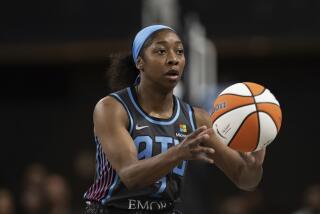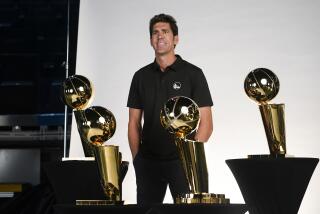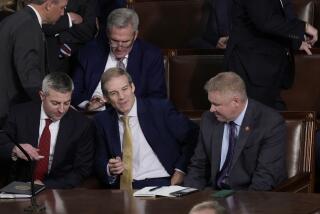Is Jordan Making Right Moves?
- Share via
Perhaps Michael Jordan is already well on his way to transforming the Washington Wizards into a winning team. At the very least, there’s now little doubt that he’s in the midst of attempting to make a comeback to the NBA as a player. Within two years, he and new Wizards coach Doug Collins may have surrounded themselves with fast-developing young stars and high-profile free agents.
In short, Jordan may be the toast of basketball as a brilliant team-builder off the court and an ageless wonder on it. You can read the tea leaves that way if you want.
On the other hand, it is also possible that Jordan is running one of the most half-baked, amateur-hour operations you’ll ever see in pro sports. He may be in over his head. From dismissing Leonard Hamilton ham-handedly Wednesday after only one year to attempting a long-shot comeback after three years in retirement, he may be a man desperately trying to save face.
When your standards are sky high and your past is an American legend, how do you cope with running a 19-63 franchise that has little salary cap wiggle-room and almost no first-rate NBA talent on its roster?
Anybody who claims they know the answer to this conundrum is probably ignoring half the evidence--because there’s plenty that points in both directions.
One major issue, however, is now clear. To steal a phrase from Jordan, it is now 99.9 percent sure that, “as of this moment,” Jordan is trying to make a comeback.
Maybe the firing of Hamilton and the hiring of Collins, all within 24 hours, doesn’t get your heart racing. But the comments made at Thursday’s news conference--by both Jordan and Collins--certainly should. Because their words put plenty of meat on the bones of the Jordan Comeback speculation.
Speaking of hiring Collins, who coached him for three seasons in Chicago, Jordan said, “This [decision] is not depending on whether Michael Jordan is playing basketball again. . . . Three months from now, [owner Abe] Mr. Pollin says he has a feeling in his gut (that Jordan will be back with the Wizards). . . . Three months from now I can’t tell where I’ll be. ... I don’t know about (the accuracy of) Mr. Pollin’s indigestion.”
Jordan also said again that, as of this split second, he’s still 99.9 percent likely not to play again. But now he’s grinning like a cat with bird feathers sticking out of his mouth as he says it. Jordan is not only working out but quizzing the commissioner’s office about the legalities of a part-owner returning to play.
Collins insisted that his move from the TV broadcast booth back to coaching was not predicated on having the best athlete of the 20th century on his team in the 21st century.
If Jordan thinks he can still play like Jordan, then Collins thinks he’s got a pretty decent guard to fit into his lineup next season.
All this is such giddy springtime news that it makes it painful to relate the other side of the Wizards’ story. Right now, this operation runs like a three-ring circus with no ringmaster. It’s hard to imagine how the firing of a nice man, with a distinguished 28-year career as a college coach, could be handled much more clumsily than the eleventh-hour canning of Hamilton.
After the Wizards’ final game Wednesday night, Hamilton spoke to his team about plans for next season. Then, shortly afterward, three people, including two security guards, informed Hamilton that “Michael wants to see you.” After a two-hour meeting, Hamilton “resigned” and claimed it was all his idea.
Yet, Thursday, Jordan’s account created the impression that, about a dozen days ago, he decided he wanted Collins in and Hamilton out. He met with Hamilton. He contacted Collins. Collins said, “Yes.” Draw the time line of your choice.
When given no way to verbally head-fake his way out of a tight spot, Jordan tells the truth. Or doesn’t lie. That’s the way athletic superstars have learned to play the public relations game. Protect your image. Let others spin situations so you are cast in the best possible light. But that’s hardly a high standard of candor for someone whom millions have idolized.
To his credit, Jordan tried to take some blame. “It was against all odds with Leonard,” said Jordan. Putting a college coach in charge of a veteran team may have “put him behind the eight-ball. I don’t think that I made a mistake (hiring Hamilton). . . . I put a guy in a position that I don’t know if he was prepared for.”
Yet for an NBA executive, hiring a coach who, in hindsight, wasn’t prepared for the job is the definition of a mistake.
More to Read
Go beyond the scoreboard
Get the latest on L.A.'s teams in the daily Sports Report newsletter.
You may occasionally receive promotional content from the Los Angeles Times.










